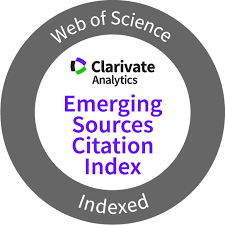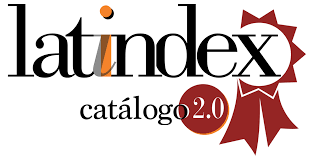Movilizando terceras opciones en España: La comunicación política de los partidos minoritarios en Twitter
DOI:
https://doi.org/10.5783/revrrpp.v12i24.779Palabras clave:
Comunicación Política, partidos minoritarios españoles, interactividad en redes sociales.Resumen
Es un escenario donde los partidos tradicionales pierden apoyo popular, los partidos minoritarios se erigen como sujetos relevantes en las democracias contemporáneas. Esta relevancia implica que desde la investigación académica la comunicación de los partidos minoritarios deba estudiarse en sus propios términos. Ignorados por los medios de comunicación tradicionales, los partidos minoritarios necesitan aprovechar las ventajas que suponen la web y las RRSS para competir con los grandes partidos. Este trabajo analiza la comunicación en redes sociales de los partidos minoritarios españoles en las elecciones generales de abril de 2019, con una muestra de 1.498 tuits recogidos de los perfiles oficiales de Twitter de los (por entonces) cuatro principales partidos minoritarios: PACMA, el Partido Comunista de los Pueblos de España, Recortes Cero y VOX. Los resultados indican falta de interacción y diálogo partidos-ciudadanos, con tuits de movilización centrados en las funciones tradicionales de impulso de la campaña.
Descargas
Citas
ABEJÓN, P., SASTRE, A. and LINARES, V. (2012). Facebook y Twitter en campañas electorales en España. Anuario Electrónico de Estudios en Comunicación Social Disertaciones, 5(1), 129-159.
AHMED, S., CHO, J. and JAIDKA, K. (2017). Leveling the playing field: The use of Twitter by politicians during the 2014 Indian general election campaign. Telematics and Informatics 34, 1377-1386. http://dx.doi.org/10.1016/j.tele.2017.09.005
AHMED, S. and SKORIC, M.M. (2014). My name is Khan: the use of Twitter in the campaign for 2013 Pakistan General Election. In: Sprague, Jr. RH (ed), Proceedings of the Forty-Seventh Annual Hawaii International Conference on System Sciences, 2242‒2251. IEEE.
ALADRO VICO, E. and REQUEIJO REY, P. (2020). Discurso, estrategias e interacciones de Vox en su cuenta oficial de Instagram en las elecciones del 28-A. Derecha radical y redes sociales. Revista Latina de Comunicación Social, 77, 203-229. https://www.doi.org/10.4185/RLCS-2020-1455
ALMANSA-MARTÍNEZ, A. and FERNÁNDEZ-SOUTO, A.-B. (2020). Professional Public Relations (PR) trends and challenges. El profesional de la información, 29(3), e290303. https://doi.org/10.3145/epi.2020.may.03
ALVÍDREZ, S.; MUÑIZ, C.; SEGOVIANO, J. and DE LA GARZA, D. (2016). Twitter en las elecciones: el estilo comunicativo empleado por los candidatos durante la campaña a la gubernatura de Nuevo León 2015. In Tamez González, G. and Arango Morales, X. (eds.), Panorama de la reforma electoral 2014 en México (157-182). Tirant.
BEKAFIGO, M. A. and MCBRIDE, A. (2013). Who Tweets About Politics? Political Participation of Twitter Users During the 2011 Gubernatorial Elections. Social Science Computer Review, 31(5), 625-643. https://www.doi.org/10.1177/0894439313490405
BERNARDEZ RODAL, A.; REQUEIJO REY, P. and FRANCO, Y.G. (2020). Radical right parties and anti-feminist speech on Instagram: Vox and the 2019 Spanish general election. Party Politics, 1-12. https://www.doi.org/10.1177/1354068820968839
BOULIANNE, Sh. (2020). Twenty Years of Digital Media Effects on Civic and Political Participation. Communication Research, 47(7), 947-966. https://www.doi.org/10.1177/0093650218808186
BURDEN, B.C. (2005). Ralph Nader’s Campaign Strategy in the 2000 U.S. Presidential Election. American Politics Research, 33(5), 672-699. https://www.doi.org/10.1177/1532673X04272431
CASERO-RIPOLLÉS, A.; FEENSTRA, R.A. and TORMEY, S. (2016). Old and New Media Logics in an Electoral Campaign: The Case of Podemos and the Two-Way Street Mediatization of Politics. The International Journal of Press/Politics, 21(3), 378-397. https://www.doi.org/10.1177/1940161216645340
CASTILLO-DÍAZ, A. and CASTILLO-ESPARCIA, A. (2021). Interest, media use, and participation in the 2019 Spanish election campaign. Profesional de la información, 30(6), e300607. https://doi.org/10.3145/epi.2021.nov.07
CASTILLO-ESPARCIA, A.; CARRETÓN-BALLESTER, C. and PINEDA-MARTÍNEZ, P. (2020). Investigación en relaciones públicas en España. Profesional de la información, 29(3), e290330. https://doi.org/10.3145/epi.2020.may.30
CASTILLO ESPARCIA, A. and SMOLAK LOZANO, E. (2017). Lobbies y think tanks. Comunicación política en la red. España: Gedisa.
CASTRO MARTÍNEZ, A. and DÍAZ MORILLA, P. (2021). La comunicación política de la derecha radical en redes sociales. De Instagram a TikTok y Gab, la estrategia digital de Vox. Dígitos, 7, 67-89. https://www.doi.org/10.7203/rd.v1i7.210
CEBRIÁN GUINOVART, E.; VÁZQUEZ BARRIO, T. and OLABARRIETA VALLEJO, A. (2013). ¿Participación y democracia en los medios sociales?: El caso de Twitter en las elecciones vascas de 2012. AdComunica, 6, 39-63. https://www.doi.org/10.6035/2174-0992.2013.6.4
CHRISTENSEN, Ch. (2013). Wave-riding and hashtag-jumping. Twitter, minority “third parties” and the 2012 US elections. Information, Communication & Society, 16(5), 646-666. https://www.doi.org/10.1080/1369118X.2013.78360
COMITÉ CENTRAL (2014). Sobre el PCPE. https://www.pcpe.es/index.php/sobre-el-pcpe.
CONGOSTO, M.L. (2015). Elecciones Europeas 2014: Viralidad de los mensajes en Twitter. REDES, 26(1), 23‒52. https://www.dx.doi.org/10.5565/rev/redes.529
DUMITRESCU, D. (2011). The importance of being present: Election posters as signals of electoral strength, evidence from France and Belgium. Party Politics, 18(6), 941-960. https://www.doi.org/10.1177/1354068810389644
ENLI, G. and MOE, H. (2013). Introduction to Special Issue. Social media and election campaigns – key tendencies and ways forward. Information, Communication & Society, 16(5), 637-645. https://www.doi.org/10.1080/1369118X.2013.784795
EVANS, H.K.; HABIB, J.; LITZEN, D.; SAN JOSÉ, B. and ZIEGENBEIN, A. (2019). Awkward Independents: What Are Third-Party Candidates Doing on Twitter? PS: Political Science and Politics, 52(1), 1-6. https://www.doi.org/10.1017/S1049096518001087
EVANS, H.K.; Cordova, V. and SIPOLE, S. (2014). Twitter Style: An Analysis of How House Candidates Used Twitter in Their 2012 Campaigns. PS: Political Science and Politics, 47(2), 454-462. https://www.doi.org/10.1017/S1049096514000389
FAHEY, J.J. (2021). Building Populist Discourse: An Analysis of Populist Communication in American Presidential Elections, 1896-2016. Social Science Quarterly, 1-21. https://www.doi.org/10.1111/ssqu.12951
FERREIRA, C. (2019). Vox como representante de la derecha radical en España: un estudio sobre su ideología. Revista Española de Ciencia Política, 51, 73-98. https://www.doi.org/10.21308/recp.51.03
FILIMONOV, K.; RUSSMANN, U. and SVENSSON, J. (2016). Picturing the Party: Instagram and Party Campaigning in the 2014 Swedish Elections. Social Media + Society, 1-11. https://www.doi.org/10.1177/2056305116662179
FROEHLICH, R. and RÜDIGER, B. (2006). Framing political public relations: Measuring success of political communication strategies in Germany. Public Relations Review, 32(2006), 18-25. https://www.doi.org/10.1016/j.pubrev.2005.10.003
FURLONG, W.L. (2001). Política costarricense en transición. Anuario de Estudios Centroamericanos, 27(1), 101-132.
GARCÍA ORTEGA, C. and Zugasti Azagra, R. (2014). La campaña virtual en Twitter: análisis de las cuentas de Rajoy y de Rubalcaba en las elecciones generales de 2011. Historia y Comunicación Social, 19(Special February Number), 299‒311. https://www.dx.doi.org/10.5209/rev_HICS.2014.v19.45029
GERRING, J. (2005). Minor Parties in Plurality Electoral Systems. Party Politics, 11(1), 79-107. https://www.doi.org/10.1177/1354068805048474
GIBSON, R.K. and MCCALLISTER, I. (2015). Normalising or Equalising Party Competition? Assessing the Impact of the Web on Election Campaigning. Political Studies, 63(3), 529-547. https://www.doi.org/10.1111/1467-9248.12107
GILLESPIE, J.D. (2013). Challengers to Duopoly. Why Third Parties Matter in American Two-Party Politics. The University of South Carolina Press.
GRAHAM, T.; BROERSMA, M.; HAZELHOFF, K. and VAN’T HAAR, G. (2013). Between broadcasting political messages and interacting with voters. The use of Twitter during the 2010 UK general election campaign. Information, Communication & Society, 16(5), 692-716. https://www.dx.doi.org/10.1080/1369118X.2013.785581
GRANT, W.J.; MOON, B. and BUSBY GRANT, J. (2010). Digital Dialogue? Australian Politicians’ use of the Social Network Tool Twitter. Australian Journal of Political Science, 45(4), 579-604. https://www.doi.org/10.1080/10361146.2010.517176
GULATI, G.J. and WILLIAMS, Ch.B. (2007). Closing the Gap, Raising the Bar. Candidate Web Site Communication in the 2006 Campaigns for Congress. Social Science Computer Review, 25(4), 443-465.
HOWARD, P.N. (2006). New Media Campaigns and the Managed Citizen. Cambridge University Press.
HUGHES, C. (2019). It’s the EU immigrants stupid! UKIP’s core-issue and populist rhetoric on the road to Brexit. European Journal of Communication, 34(3), 248-266. https://www.doi.org/10.1177/0267323119830050
KALSNES, B. (2016). The social media paradox explained: Comparing political parties’ Facebook strategy versus practice. Social Media+ Society, 2(2), 1-11. https://www.doi.org/10.1177/2056305116644616
KIM, Y. (2015). Toward an effective government–public relationship: Organization–public relationship based on a synthetic approach to public segmentation. Public Relations Review, 41, 456-460. https://doi.org/10.1016/j.pubrev.2015.06.020
KRIPPENDORFF, K. (2004). Content analysis: An introduction to its methodology. Thousand Oaks, CA, USA: Sage.
LAFUENTE PÉREZ, P. and VERÓN LASSA, J.J. (2013). El uso de Twitter por los líderes de las organizaciones políticas minoritarias en la campaña electoral de las generales de 2011. In Crespo Martínez I (dir), Partidos, medios y electores en procesos de cambio las elecciones generales españolas de 2011 (541-562). Valencia, España: Tirant.
LAMARRE, H.L. and Suzuki-Lambrecht, Y. (2013). Tweeting democracy? Examining Twitter as an online public relations strategy for congressional campaigns. Public Relations Review, 39, 360-368. https://doi.org/10.1016/j.pubrev.2013.07.009
LARSSON, A.O. and MOE, H. (2011). Studying political microblogging: Twitter users in the 2010 Swedish election campaign. New Media & Society, 14(5), 729-747. https://doi.org/10.1177/1461444811422894
LAVA SANTOS, D. (2021). El discurso populista de VOX en las Elecciones Generales de 2019: análisis comparativo de las agendas temáticas en televisión y Twitter. Dígitos, 7, 37-65. https://doi.org/10.7103/rd.vi1i7.200
MINISTERIO DEL INTERIOR DEL GOBIERNO DE ESPAÑA [MIGE] (n.d.). Congreso / Junio 2016. http://www.infoelectoral.mir.es/infoelectoral/min/busquedaAvanzadaAction.html.
MIRER, M.L. and BODE, L. (2015). Tweeting in defeat: How candidates concede and claim victory in 140 characters. New Media & Society, 17(3), 453‒469. https://doi.org/10.1177/1461444813505364
NAM Y.; LEE Y-O. and PARK H.W. (2015). Measuring web ecology by Facebook, Twitter, blogs and online news: 2012 general election in South Korea. Qual Quant, 49, 675-689.
NEVILLE-SHEPARD, R. (2014a). Presidential Campaign Announcements: A Third-Party Variant. Southern Communication Journal, 79(2), 130-146. https://doi.org/10.1080/1041794X.2013.866157
NEVILLE-SHEPARD, R. (2014b). Triumph in Defeat: The Genre of Third Party Presidential Concessions. Communication Quarterly, 62(2), 214-232. https://doi.org/10.1080/01463373.2014.890119
NEVILLE-SHEPARD, R. (2017). Constrained by Duality: Third-Party Master Narratives in the 2016 Presidential Election. American Behavioral Scientist, 61(4), 414-427. https://doi.org/10.1177/0002764217709042
PACMA (2019). pacma.es/elecciones-201… [Twitter] 18 April. https://twitter.com/PartidoPACMA/status/1118799396148318209.
PARTIDO ANIMALISTA PACMA (n.d.). Presentación. https://pacma.es/presentacion/
PINEDA, A.; FERNÁNDEZ GÓMEZ, J.D. and REBOLLO-BUENO, S. (2021). “We Have Taken a Major Step Forward Today”: The Use of Twitter by Spanish Minor Parties. Southern Communication Journal, 86(2), 146-164. https://doi.org/10.1080/1041794X.2021.1882545
PINEDA CACHERO, A. (2010). Relaciones públicas y propaganda: algunas reflexiones teórico-conceptuales. In Carretón Ballester, M.C. and Ordeix Rigo, E. (Eds), Las Relaciones Públicas en la Sociedad del Conocimiento (496-513). AIRP.
RAMOS-SERRANO, M.; FERNÁNDEZ GÓMEZ, J.D. and PINEDA, A. (2018). ‘Follow the closing of the campaign on streaming’: The use of Twitter by Spanish political parties during the 2014 European elections. New Media & Society, 20, 122-140. https://doi.org/10.1177/1461444816660730
RAPOPORT, R.B. and STONE W.J. (2019). Three’s a crowd. The dynamic of third parties, Ross Perot, & Republican resurgence. University of Michigan Press.
SANJUÁN SANTONJA, M. (2015). Nuevas formaciones políticas crecidas en Internet y su entrada en las Elecciones Europeas 2014: el caso de Movimiento RED, Podemos, Recortes Cero y Partido X. Dígitos, 1, 71-89. http://dx.doi.org/10.7203/rd.v0i1.4
SERFATY, V. (2012). E-The People: a comparative perspective on the use of social networks in U.S. and French electoral campaigns. Revista Comunicação Midiática, 7(3), 195-214.
SIMÓN, P. (2016). The Challenges of the New Spanish Multipartism: Government Formation Failure and the 2016 General Election. South European Society and Politics, 21(4), 493-517. https://doi.org/10.1080/13608746.2016.1268292
SIMÓN, P. (2020). The Multiple Spanish Elections of April and May 2019: The Impact of Territorial and Left-right Polarisation. South European Society and Politics, 25(3-4), 441-474. https://doi.org/10.1080/13608746.2020.1756612
SMALL, T.A. (2011). What the hashtag? A content analysis of Canadian politics on Twitter. Information, Communication & Society, 14(6), 872-895. https://doi.org/10.1080/1369118X.2011.554572
STEFFAN, D. and VENEMA, N. (2020). New medium, old strategies? Comparing online and traditional campaign posters for German Bundestag elections, 2013-2017. European Journal of Communication, 35(4), 370-388. https://doi.org/10.1177/0267323120903681
SUBIRATS, J. and VALLESPÍN, F. (2015). España/reset: herramientas para un cambio de sistema. Ariel.
TENA, A. (2019). Laura Duarte: ‘Lo que en España se conoce como izquierda hace mucho daño a los animales’. Público. https://www.publico.es/politica/laura-duarte-espana-conoce-izquierda-dano-animales.html.
TSICHLA, E.; HATZITHOMAS, L.; BOUTSOUKI, Ch. and ZOTOS, K. (2019). Greek political advertising in retrospect: a longitudinal approach. Communication Research Reports, 36(5), 404-414. https://doi.org/10.1080/08824096.2019.1683526
VALERA ORDAZ, L. (2017). Comparing the democratic value of Facebook discussions across the profiles of spanish political candidates during the 2011 general election. Revista Internacional de Sociología, 75(1), 1-15. https://dx.doi.org/10.3989/ris.2017.75.1.15.119
VERGEER, M. (2020). Political Candidates’ Discussions on Twitter During Election Season: A Network Approach. In Bouvier, G. and Rosenbaum, J.E. (eds), Twitter, the Public Sphere, and the Chaos of Online Deliberation (53-78). UK: Palgrave Macmillan.
VERGEER, M. and HERMANS, L. (2013). Campaigning on Twitter: Microblogging and Online Social Networking as Campaign Tools in the 2010 General Elections in the Netherlands. Journal of Computer-Mediated Communication, 18, 399-419. https://doi.org/10.1111/jcc4.12023
VOX (n.d.). Qué es VOX. https://www.voxespana.es/espana/que-es-vox.
WHEELER, M. (2014). The mediatization of celebrity politics through the social media. International Journal of Digital Television, 5(3), 221-235.
Descargas
Publicado
Cómo citar
Número
Sección
Licencia
Derechos de autor 2022 Revista Internacional de Relaciones Públicas

Esta obra está bajo una licencia internacional Creative Commons Atribución-NoComercial-SinDerivadas 4.0.
Los autores que publican en esta revista están de acuerdo con los siguientes términos:- Los autores conservan los derechos de autor y garantizan a la revista el derecho de ser la primera publicación del trabajo al igual que licenciado bajo una Creative Commons Attribution License que permite a otros compartir el trabajo con un reconocimiento de la autoría del trabajo y la publicación inicial en esta revista.
- Los autores pueden establecer por separado acuerdos adicionales para la distribución no exclusiva de la versión de la obra publicada en la revista (por ejemplo, situarlo en un repositorio institucional o publicarlo en un libro), con un reconocimiento de su publicación inicial en esta revista.
- Se permite y se anima a los autores a difundir sus trabajos electrónicamente (por ejemplo, en repositorios institucionales o en su propio sitio web) antes y durante el proceso de envío, ya que puede dar lugar a intercambios productivos, así como a una citación más temprana y mayor de los trabajos publicados (Véase The Effect of Open Access) (en inglés).





